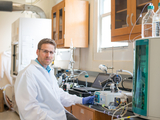Christopher Hennigan, assistant professor of chemical, biochemical and environmental engineering, has received a highly prestigious National Science Foundation (NSF) CAREER award of over a half million dollars to further his atmospheric particle research.
The $524,606 award begins in September 2015 and will continue through August 2020. It is funded through NSF’s Faculty Early Career Development (CAREER) Program, which recognizes junior faculty who exemplify the role of teacher-scholar.
NSF’s CAREER Program is designed to provide “a firm foundation for a lifetime of leadership in integrating education and research.” Hennigan’s award will support the project, “Characterizing Acid‐Catalyzed Secondary Organic Aerosol Formation in the Atmosphere.”
“This award represents a great opportunity to pursue one of my core areas of research,” says Hennigan. “The five-year duration of the award is especially advantageous, as it will allow us to push the work forward in a highly significant way.”
Hennigan’s lab focuses on pollutants known as particulate matter or aerosols—small particles in the air that have detrimental effects on human health and important implications for climate change. Through this grant, Hennigan and his team will characterize the effects of acid-catalyzed reactions on the atmospheric transformation of volatile organic compounds into secondary organic aerosol (SOA), a ubiquitous component in the atmosphere that contributes to aerosol effects on human health and climate.
Hennigan will work to develop new methods to rapidly measure particle acidity, to create an automated system that provides the best combination of high time resolution and accuracy of any aerosol acidity measurement technique to-date. He will deploy the resulting new technique to bridge the apparent disagreement between laboratory and ambient studies on the role of particle acidity in forming SOA. This research will ultimately make for more accurate models representing SOA formation, thus improving scientists’ ability to make predictions related to ambient aerosol loadings.
UMBC graduate and undergraduate students and talented local high school students will participate in this research, providing fresh perspectives for the work and gaining greater exposure to environmental chemistry research careers.
Tags:
Posted: September 18, 2015, 10:25 AM
